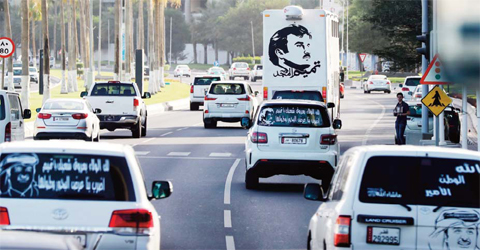Hamad port bustling with ships loaded with food, building materials
 DOHA: A general view taken on June 11, 2017 shows portraits of Qatar’s Emir Sheikh Tamim bin Hamad Al-Thani on the back of vehicles and text reading in Arabic: “Tamim the glorious”. —AFP
DOHA: A general view taken on June 11, 2017 shows portraits of Qatar’s Emir Sheikh Tamim bin Hamad Al-Thani on the back of vehicles and text reading in Arabic: “Tamim the glorious”. —AFPANKARA/DOHA: Turkey said yesterday Qatar's rift with fellow Gulf Arab states and Egypt was damaging the Islamic world and it would do all it could by diplomatic channels to prevent any escalation. President Tayyip Erdogan, who has cultivated close ties to Doha while preserving relations with Saudi Arabia, dispatched his foreign minister to Doha in a bid to solve a dispute raising concern across the Middle East and beyond.
Saudi Arabia, Egypt, the United Arab Emirates and Bahrain have broken off ties and imposed sanctions on Qatar, accusing it of supporting terrorism and courting regional rival Iran - allegations Doha denies. "Our main priority as part of our efforts with both Qatar and Saudi Arabia and other Gulf countries is to solve this through negotiations, not to escalate the crisis," President Tayyip Erdogan's spokesman Ibrahim Kalin told an Ankara news conference. "Today we are having to tackle many problems such as Daesh (Islamic State), the ongoing war in Syria, the fight against terrorism and poverty. Amid all this, tensions further escalating in the region through such a crisis would mean wasting of the region's resources and opportunities."
Turkey and Qatar have both provided support for the Muslim Brotherhood in Egypt and backed rebels fighting to overthrow Syrian President Bashar Al-Assad. Conservative Gulf neighbours have long viewed Qatar's outgoing foreign policy with suspicion. The Gulf Arab states have not made public any demands of Qatar but a journalist with the state-funded Al Jazeera network has shared a list that includes Qatar severing diplomatic ties with Iran and expelling members of the Palestinian Hamas group and the Muslim Brotherhood who live in Doha.
The list of demands also includes ending support for "terrorist organizations" and ceasing "interference" in Egyptian affairs, charges Qatar denies. Kalin said a Turkish military base in Qatar, set up before the regional spat, was established to ensure the security of the whole region and did not pose any military threat to any other country.
Turkey approved plans last week to deploy more troops to the base after the crisis began. But it was not immediately clear if they arrived. The measures against Qatar, which has a population of 2.7 million people but vast gas wealth, have disrupted imports of food and other materials and caused some foreign banks to scale back business. Qatar, which imported 80 percent of its food from bigger Gulf Arab neighbours before the diplomatic shutdown, has been talking to Iran and Turkey to secure food and water.
At Qatar's Hamad port yesterday, workers were busy unloading containers of food and building materials, while another ship carrying livestock, including chicken and sheep from Australia had docked at the port. "There is a service from India... which used to come via Jebel Ali port (in the United Arab Emirates) but is now redirected," said a port official who declined to be named. "The first vessel on that service is to arrive Friday and will run once a week," he added.
Africa
Turkish Foreign Minister Mevlut Cavusoglu flew to Doha for a meeting with Qatar's Emir Sheikh Tamim bin Hamad al-Thani during a tour that may also include a visit to Saudi Arabia. There was no word either from Qatar or Saudi Arabia about the visit. The effects of the dispute could widen beyond the region. Yesterday, Qatar said it had withdrawn troops from the border between the east African states of Djibouti and Eritrea where the Gulf state has been acting as mediator in a border dispute. It gave no reasons for the move, but Djibouti had earlier downgraded its diplomatic ties with Qatar after the Gulf move against Doha.
Last week, Saudi Arabia, the UAE, Bahrain and Egypt announced a list of 59 people, including Muslim Brotherhood spiritual leader Yousef Al-Qaradawi, and 12 entities, among them Qatari-funded charities Qatar Charity and Eid Charity, who had been designated as terrorists. Qatar has rejected the list and said it adheres to United Nations Security Council resolutions on countering terrorism including eradicating sources of financing for terrorism. Iraqi Prime Minister Haider al-Abadi has criticized the measures imposed on Qatar, saying they were hurting the emirate's people, not its rulers.
Saudi Foreign Minister Adel Al-Jubeir, speaking after talks in Washington with US Secretary of State Rex Tillerson on Tuesday, said the measures taken against Doha did not amount to a blockade since Qatar's airports and ports remained open and offered to send supplies to Qatar if needed. The Qatari foreign ministry said Saudi Arabia's offer to provide food and medical assistance confirmed that the closure of transport links "is a siege, not a boycott, and reflects the clear contradiction in statements by officials of those countries." - Reuters










